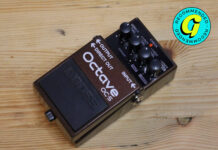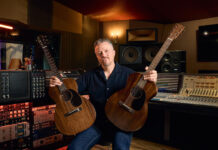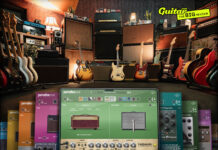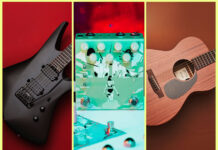
Daughter says they focused was on parts rather than “fiddling” with gear on Stereo Mind Game
There’s not much to it, really: insistent bass chords, clicking drumsticks, the steady snap of a snare, and Elena Tonra’s measured voice. “You seem disappointed that your stories got lost down a hole in the back of my head,” she sings, setting another elegant trap. Before you have a chance to react, Daughter have you in their grasp – you’re the latest in a long line of someones pouring out your experiences into a mould of their making.
READ MORE: “We’re set in our ways, but this record got us out of it” Mudhoney on breaking the mould eleven albums in
The song is called Party, and it’s as close to a perfect example of the trio’s power as you’ll find on their new record Stereo Mind Game. It grows and grows and grows, tying a nagging counter-melody around Tonra’s vocals before slipping away into warm, fuzzed-out nothingness. It offers the sort of gentle nudge into emotional devastation that Daughter have become masters at delivering – be trying to wreck you, they just wreck you.
When asked how they hit that bullseye with such regularity, guitarist Igor Haefeli focuses on knowing when you have the right performance in the can. “There’s no specific recipe,” he says. “It’s just being prepared enough in any given situation so that if it’s the take, it’s the take, and there’s no ‘I wish this or that could have been different’. That also comes with having more equipment, having more means to create that environment. But what I will say is that the technical aspect doesn’t really matter. If it’s the take, it’s the take.”
One feature of Stereo Mind Game that’s particularly interesting, though, is that with lyrics such as this one, Daughter aren’t out to paint a picture of something broken. Instead, they’re trying to paint a picture of something that doesn’t need to be fixed. Tonra’s words deal with a person she met while visiting Haefeli in San Diego during the writing process. They cut deep into one another, but it wasn’t going to pan out: there were different countries involved, and lives, and stuff. This record is about accepting that and moving on in the knowledge that things can matter even if they don’t last forever. It’s all very grown up, and liberating for it.
Credit: 4AD
Tweaking Out
The bait and switch comes off because, despite a six year absence, Daughter’s core preoccupations haven’t changed all that much: this is a delicate, beautifully staged record that appreciates texture and space above everything else. Part of that continuity can probably be traced to the fact that its bones date back to the fallow period in the wake of 2016’s Not to Disappear and the following year’s Music from Before the Storm, a video game soundtrack that, perhaps unsurprisingly, boasted a more electronic edge than their earlier work.
“A few have existed for a long time, either as ideas or as half written songs,” Haefeli says. “In 2017, that’s when we started really compiling ideas, and then we took a break for six plus months. That’s when Elena made her solo record [2018’s Ex:Re]. We were chatting about what was going to make our new album, because it was, in part, about coming up with ideas and seeing what was coming through subject-wise, thematically and also stylistically. Was there a running thread?”
As with so many recent records, Covid-19 put the brakes on things for a while. In fact, Haefeli and Tonra didn’t see drummer Remi Aguilella in person until after recording – conducted between Devon, Bristol and London in the UK, San Diego, Portland, and Vancouver, Washington in the States – was finished. For Haefeli, who quickly admits to being the band’s tweaker-in-chief, that opened up the possibility of over-thinking things, and crushing the spirit of a song before thoughts can even turn to ‘the take’.
“This was definitely an album where a song existed in multiple versions, it kind of went through different skins, different iterations, until the one that felt the most right,” he says. “That was something that I wasn’t precious about. It just needed to feel right – very often the vocals would stay the same, it would just be the arrangement that needed changing.”
Working Time
Some of the dynamism found in Daughter’s music is derived from the turmoil of the lyrics being repelled time and time again by the poise and precision of the compositions. On Stereo Mind Game, that feeling is only heightened by a heavier reliance on strings and brass for additional colour. Even with these extra elements in play, the balance between them is something that they will not sacrifice – it’s like they’re fixing a Swiss watch while spinning a bunch of plates. Having experimented with a broader palette on their 2014 EP Live @ Air they were aware of the potential avenues available to them while countenancing restraint when it came to muddling the melodic thrust of the vocals.
“Well, there was a lot of MIDI,” Haefeli says. “I ended up writing quite a lot with string sounds to start with. I would have an idea, and lay that down with some sample to see how it felt as a string piece, basically. We also had worked with strings before – we did the little EP with an ensemble, and we did live shows with horns as well. We had this connection with those instruments and types of arrangements already. I think we just wanted to capitalise on that.”
Credit: Marika Kochiashvili
“There’s this tension between the vocal, and the lyrics being central, but also the music,” he adds. “There’s this sort of unfair weight of importance between vocal and music. Music takes enormous amounts of work – I’m not saying vocals don’t – but it’s a stack of performances. You’ve got drums, you’ve got bass, you’ve got guitar, you’ve got a second guitar, you’ve got strings, but even all together that doesn’t have as much weight as the vocal. Understandably, it’s not a complaint, but it’s funny how you have to work so hard to get that right, for it to shine and not take away from the vocal, which is the guiding light of the song.”
Daughter’s sound suggests a great deal of patience and discipline from the guitarists, with long waits for well-placed hooks or crystalline chord patterns, but in the studio Haefeli’s approach to the mix was to go nuts with the layers, then pull things out. “The way we made the album was sort of like a painting but also patchwork,” he says. “There was actually a lot of playing. I got to scratch that itch, and then just keep the best bits. That is the beauty and the curse of the time we live in and the technology we have available. For me, it’s how are you emotionally reacting to the song? How do you feel about your part? All three of us are very focused on that.”
Studio Masters
In the studio, Haefeli used a couple of live bankers – his Les Paul and a Pawn Shop series Mustang – alongside a pedal list that is similarly pocked with regular collaborators. “The Mustang has got humbuckers but you can split the coils so you get this variety of tonal sounds – it’s a nice, easy neck to play, compared to the Les Paul,” he says. “Nicolas Vernhes, who worked with us on our second record, said that a Les Paul is like a piano. It just has all these overtones. With reverb, it kind of sounds like strings as well.”
“Chase Bliss Audio’s Warped Vinyl and Tonal Recall were two major pedals for this record,” he adds in an email, having needed time to note his complete setup. “The Eventide Space is still my main reverb in pedal format but I also used an Eventide H3500 and an Alesis MidiVerb II for vintage digital reverb sounds. The Earthquaker Devices Avalanche Run made an appearance on some songs and a Strymon Timeline takes care of most of the delays I need, but the Memory Man with Hazarai is what I used for reverse delays. Some plug-ins once in a while too – whatever works.”
While assembling the songs, Haefeli and the band also went back and forth on sound-at-source versus the versatility of reamping, with their focus on execution always a major consideration. Along with some trusted allies in a Fender Twin Reverb and Hot Rod Deluxe, DI-ed guitars were fed into a UBK Fatso, with notable contributions from Carlsbro 50 Top, a five watt Bad Cat Mini Cat, and a Groove Tubes Studio Series Tube Pre-Amp.
“I tend to DI and we did do a fair bit of reamping in the end, but I think that was because I was always more interested in the part than the sound to start with, and we were coming up with stuff in the studio,” he says. “We were doing everything ourselves, so it just meant that the focus was more on what the part was than fiddling about with amps and pedals. But, when possible, having the right sound to start with is amazing – it just feels right and it helps you have the full picture much quicker.”
Music as ornate and refined as Daughter’s can be cold – it’s this commitment to finding honesty in the instrumental interactions that allows Tonra’s lyrics to pop. Stereo Mind Game is still ornate and refined, of course it is, but there’s also blood and guts and feeling here. “The mic positioning, the compressor, whatever, that’s just the last 5 per cent,” Haefeli says. “No one cares.”
Daughter’s Stereo Mind Game is out now through 4AD.
The post Daughter says they focused was on parts rather than “fiddling” with gear on Stereo Mind Game appeared first on Guitar.com | All Things Guitar.
Source: www.guitar-bass.net













